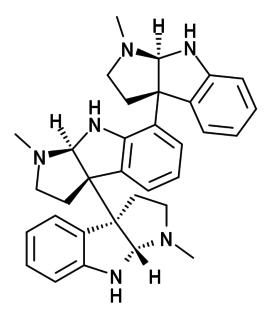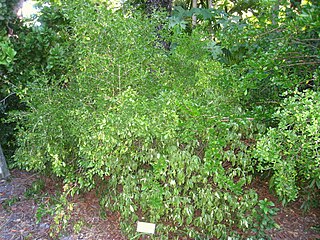
The Rubiaceae are a family of flowering plants, commonly known as the coffee, madder, or bedstraw family. It consists of terrestrial trees, shrubs, lianas, or herbs that are recognizable by simple, opposite leaves with interpetiolar stipules and sympetalous actinomorphic flowers. The family contains about 13,500 species in about 620 genera, which makes it the fourth-largest angiosperm family. Rubiaceae has a cosmopolitan distribution; however, the largest species diversity is concentrated in the tropics and subtropics. Economically important species include Coffea, the source of coffee, Cinchona, the source of the antimalarial alkaloid quinine, some dye plants, and ornamental cultivars.

Psychotria viridis is a perennial, shrubby flowering plant in the coffee family Rubiaceae. It is a close relative of Psychotria carthagenensis of Ecuador. In the Quechua languages it is called chacruna or chacrona. In Quechua, chaqruy is a verb meaning "to mix".

Psychotria carthagenensis, also known as amyruca, is a South American rainforest understory shrub from the coffee family, Rubiaceae. It grows from the tropics of South America to Mexico.

Raphides are needle-shaped crystals of calcium oxalate monohydrate or calcium carbonate as aragonite, found in more than 200 families of plants. Both ends are needle-like, but raphides tend to be blunt at one end and sharp at the other.

Psychotria is a genus of flowering plants in the family Rubiaceae. It contains 1,582 species and is therefore one of the largest genera of flowering plants. The genus has a pantropical distribution and members of the genus are small understorey trees in tropical forests. Some species are endangered or facing extinction due to deforestation, especially species of central Africa and the Pacific.

Palicourea is a plant genus in the family Rubiaceae. It contains about 200 species, which range from shrubs to small trees, and is distributed throughout the New World tropics.
Psychotria deverdiana is a species of plant in the family Rubiaceae. It is endemic to New Caledonia.
Psychotria greenwelliae, the Kauai wild coffee, is a species of plant in the family Rubiaceae. It is endemic to the islands of Kauai and Oahu in Hawaii. It is threatened by habitat loss.
Psychotria hobdyi, the milolii kopiwai, Hobdy's wild-coffee or kopiko, is a species of plant in the family Rubiaceae. It is endemic to the Hawaiian Islands, where it is known only from the island of Kauai. There are about 10 populations for a total of about 120 individuals. It is threatened by habitat loss and was federally listed as an endangered species of the United States in 2010.

Psychotria poeppigiana is a plant species in the family Rubiaceae; a common name is sore-mouth bush, though it is not very often used. This species is currently accepted as Palicourea tomentosa based on a journal article published in 2011.

Psychotria colorata is a species of plant in the family Rubiaceae. It has been documented in an ethnobotanical context among the Ka'apor people of Maranhão, Brazil by Dr. William Balée, the Tulane University anthropologist and historical ecologist:

Hodgkinsine is an alkaloid found in plants of the genus Psychotria, particularly Psychotria colorata, although it is also found in Psychotria lyciiflora and probably other species in this family,

Thyrocopa is a genus of moths in the family Xyloryctidae endemic to Hawaii. The taxon has approximately forty species, including some flightless species.

Psychotridine is an alkaloid found in some species of the genus Psychotria, namely Psychotria colorata, but also Psychotria forsteriana, Psychotria lyciiflora, Psychotria oleoides, and Psychotria beccarioides. Psychotridine has analgesic effects and dose-dependently inhibits dizocilpine binding to cortical membranes in vitro, suggesting that it acts as a non-competitive NMDA receptor antagonist.

Psychotria nervosa, also known as Seminole balsamo or wild coffee, is a shade tolerant medium-sized shrub native to Florida as well as the West Indies and Central and South America. It produces a "small, red, ellipsoid fruit" that resembles "the true coffee bean" in shape and attract birds. Its maximum height ranges from approximately 4–10 feet.

Psychotria ligustrifolia, the Bahama wild coffee, is a species of plant in the family Rubiaceae. It is endemic to Florida, Puerto Rico, and the Bahamas.
Myrsine linearifolia is a rare species of flowering plant in the primrose family known by the common name narrowleaf colicwood. It is endemic to Hawaii, where it is known only from the island of Kauai. There are 12 populations remaining, for a total of fewer than 200 plants. Like other Hawaiian Myrsine this plant is called kōlea. It is a federally listed threatened species of the United States.

Psychotrieae is a tribe of flowering plants in the family Rubiaceae and contains about 2114 species in 17 genera. Its representatives are found in the tropics and subtropics.

Protea punctata, also known as the water sugarbush or water white sugarbush, is a shrub belonging to the genus Protea which is found growing in the wild in South Africa.

Psychotria tenuifolia, commonly known as velvet-leaved wild coffee, is a species of plant in the family Rubiaceae. It is endemic to southern Florida, South America and the Caribbean.. The description of velvet is based on the silky appearance that the leaves display in relation to other species of the same plant family.















